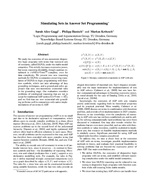Simulating Sets in Answer Set Programming
Aus International Center for Computational Logic
Simulating Sets in Answer Set Programming
Sarah Alice GagglSarah Alice Gaggl, Philipp HanischPhilipp Hanisch, Markus KrötzschMarkus Krötzsch
Sarah Alice Gaggl, Philipp Hanisch, Markus Krötzsch
Simulating Sets in Answer Set Programming
In Luc De Raedt, eds., Proceedings of the 31st International Joint Conference on Artificial Intelligence (IJCAI 2022), 2634--2640, 2022. ijcai.org
Simulating Sets in Answer Set Programming
In Luc De Raedt, eds., Proceedings of the 31st International Joint Conference on Artificial Intelligence (IJCAI 2022), 2634--2640, 2022. ijcai.org
- KurzfassungAbstract
We study the extension of non-monotonic disjunctive logic programs with terms that represent sets of constants, called DLP(S), under the stable model semantics. This strictly increases expressive power, but keeps reasoning decidable, though cautious entailment is coNexpTime^NP-complete, even for data complexity. We present two new reasoning methods for DLP(S): a semantics-preserving translation of DLP(S) to logic programming with function symbols, which can take advantage of lazy grounding techniques, and a ground-and-solve approach that uses non-monotonic existential rules in the grounding stage. Our evaluation considers problems of ontological reasoning that are not in scope for traditional ASP (unless ExpTime = Π2P), and we find that our new existential-rule grounding performs well in comparison with native implementations of set terms in ASP. - Weitere Informationen unter:Further Information: Link
- Projekt:Project: CPEC, NAVAS, ScaDS.AI
- Forschungsgruppe:Research Group: Logische Programmierung und ArgumentationLogic Programming and Argumentation, Wissensbasierte SystemeKnowledge-Based Systems
@inproceedings{GHK2022,
author = {Sarah Alice Gaggl and Philipp Hanisch and Markus Kr{\"{o}}tzsch},
title = {Simulating Sets in Answer Set Programming},
editor = {Luc De Raedt},
booktitle = {Proceedings of the 31st International Joint Conference on
Artificial Intelligence (IJCAI 2022)},
publisher = {ijcai.org},
year = {2022},
pages = {2634--2640},
doi = {10.24963/ijcai.2022/365}
}

